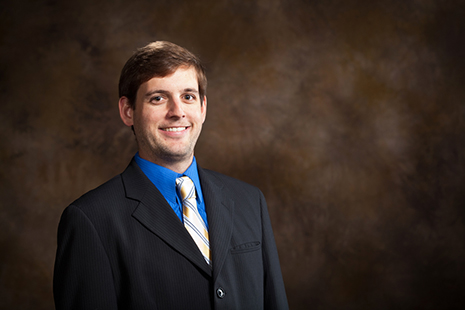FAYETTEVILLE, Ark. – Matthew Ganio, an assistant professor of exercise science, has been named director of the Human Performance Laboratory at the University of Arkansas.
Ganio earned a doctorate in exercise physiology from the University of Connecticut and completed his post-doctoral training at the Institute for Exercise and Environmental Medicine at the University of Texas Southwestern Medical Center. He serves as a member of the Medical and Science Advisory Board and as chief statistical officer of the Korey Stringer Institute at the University of Connecticut. The Korey Stringer Institute’s mission is to provide research information, resources, assistance and advocacy for the prevention of sudden death in sport.
Ganio joined the faculty of the College of Education and Health Professions in 2011.
“We are glad to have someone of Dr. Ganio’s educational and research background to step into this role,” said Tom Smith, dean of the college. “He takes over for Ro Di Brezzo, who is now vice provost for academic affairs, and he has many ideas for continuing to involve our students in research that will improve people’s lives. We also value his strong connections to the University of Connecticut, which is ranked the No. 1 program in kinesiology in the country by the National Academy of Kinesiology.”
The Human Performance Lab, which is situated in the Health, Physical Education and Recreation Building, provides opportunities for students and faculty to work together on research and service projects. Some programs based in the lab include Fitness for Fun, a community-based fitness program designed to assist people in developing healthier lifestyles through exercise; the Office for Studies on Aging, which supports and promotes research in the field of gerontology, provides advocacy to improve quality of life across the lifespan, and creates outreach opportunities for service to an aging population; and RazorSharp, which provides University of Arkansas student-athletes one-on-one nutritional counseling in a confidential setting.
The lab also plays a critical role in educating students who are taking exercise science classes.
“We have about 120 students a year taking classes operated out of the Human Performance Laboratory,” Ganio said. “The laboratory has the equipment necessary to train the next generation of exercise science professionals.”
Many of the more than 70 Honors College undergraduate students in kinesiology conduct research projects in the lab. They work with faculty members to learn to use the equipment in the lab and design research using that equipment.
For example, some students are assisting Tyrone Washington, assistant professor of kinesiology, with experiments into how skeletal muscle changes when subjected to different stimuli. Washington trains students to study what genes are activated and what proteins are expressed when muscle regenerates after damage from overuse, injury or disease.
Another group of students is studying a relatively new concept called “green exercise,” Ganio said. The theory is that exercise produces greater improvement in mood when the exerciser is surrounded by attractive landscapes, even if it’s only from images on a screen. The concept is being studied as a method of encouraging more people to exercise regularly.
This last study also illustrates the multidisciplinary aspect of the lab, Ganio said. Arie Greenleaf, an assistant professor of counselor education, is helping assess whether participating in green exercise reduces the time an individual spends in mental health counseling.
Topics
Contacts
Matthew Ganio, director of Human Performance Lab
College of Education and Health Professions
479-575-6762,
Heidi Wells, content writer and strategist
Global Campus
479-879-8760,
